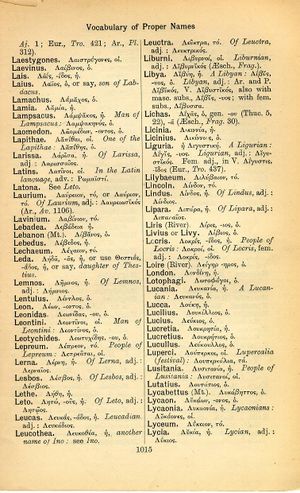Leda: Difference between revisions
ἄνθρωπος ὢν ἥμαρτον· οὐ θαυμαστέον → being human I made a mistake; there is nothing remarkable about it
m (Text replacement - "]]>" to "]]") |
(D_5) |
||
| Line 4: | Line 4: | ||
{{Lewis | {{Lewis | ||
|lshtext=<b>Lēda</b>: ae, and Lēdē, ēs, f., = [[Λήδα]],<br /><b>I</b> the [[daughter]] of [[Thestius]], and [[wife]] of Tyndarus; she [[bore]] by Jupiter, [[who]] visited her in the form of a [[swan]], [[two]] eggs, from one of [[which]] came [[Pollux]] and Helen, and from the [[other]] [[Castor]] and Clytemnestra, Ov. H. 17, 55; id. M. 6, 109; Hyg. Fab. 77: pueri Ledae, i. e. [[Castor]] and [[Pollux]], Hor. C. 1, 12, 25.—She [[was]] deified [[after]] her [[death]], under the [[name]] of [[Nemesis]], Lact. 1, 21: Lede, Ov. Am. 1, 10, 3: chironomon Ledam saltare, i. e. in the [[part]] of [[Leda]] in a pantomime, Juv. 6, 63.—Hence,<br /><b>II</b> Lēdaeus, a, um, adj., of or belonging to [[Leda]], Ledæan.<br /> <b>A</b> Lit.: Ledaei dei, i. e. [[Castor]] and [[Pollux]], Ov. F. 1, 706; also, Lacones, Mart. 1, 37, 2: [[Helena]], Verg. A. 7, 364: [[Hermione]] (as granddaughter of [[Leda]]), id. ib. 3, 328: [[ovum]], a [[swan]]'s [[egg]], Mart. 8, 33, 21; cf. olores, id. 1, 54, 8: [[Timavus]], [[because]] [[Castor]], on the [[return]] of the Argonauts, [[let]] his [[horse]] Cyllarus [[drink]] of it, id. 4, 25, 5; cf. Cyllarus, Stat. S. 1, 1, 54: [[astrum]], i. e. [[Castor]] and [[Pollux]], Mart. 8, 21, 5.—<br /> <b>B</b> Poet., transf.<br /> <b>1</b> Spartan: Phalantum, [[Tarentum]], founded by the Spartan [[Phalantus]], Mart. 8, 28, 3: [[gurges]], i. e. of the [[Eurotas]], Stat. S. 2, 6, 45. —<br /> <b>2</b> Amyclæan ([[because]] [[Castor]] and [[Pollux]] were [[born]] at Amyclæ): [[Xanthippus]], Sil. 4, 358. | |lshtext=<b>Lēda</b>: ae, and Lēdē, ēs, f., = [[Λήδα]],<br /><b>I</b> the [[daughter]] of [[Thestius]], and [[wife]] of Tyndarus; she [[bore]] by Jupiter, [[who]] visited her in the form of a [[swan]], [[two]] eggs, from one of [[which]] came [[Pollux]] and Helen, and from the [[other]] [[Castor]] and Clytemnestra, Ov. H. 17, 55; id. M. 6, 109; Hyg. Fab. 77: pueri Ledae, i. e. [[Castor]] and [[Pollux]], Hor. C. 1, 12, 25.—She [[was]] deified [[after]] her [[death]], under the [[name]] of [[Nemesis]], Lact. 1, 21: Lede, Ov. Am. 1, 10, 3: chironomon Ledam saltare, i. e. in the [[part]] of [[Leda]] in a pantomime, Juv. 6, 63.—Hence,<br /><b>II</b> Lēdaeus, a, um, adj., of or belonging to [[Leda]], Ledæan.<br /> <b>A</b> Lit.: Ledaei dei, i. e. [[Castor]] and [[Pollux]], Ov. F. 1, 706; also, Lacones, Mart. 1, 37, 2: [[Helena]], Verg. A. 7, 364: [[Hermione]] (as granddaughter of [[Leda]]), id. ib. 3, 328: [[ovum]], a [[swan]]'s [[egg]], Mart. 8, 33, 21; cf. olores, id. 1, 54, 8: [[Timavus]], [[because]] [[Castor]], on the [[return]] of the Argonauts, [[let]] his [[horse]] Cyllarus [[drink]] of it, id. 4, 25, 5; cf. Cyllarus, Stat. S. 1, 1, 54: [[astrum]], i. e. [[Castor]] and [[Pollux]], Mart. 8, 21, 5.—<br /> <b>B</b> Poet., transf.<br /> <b>1</b> Spartan: Phalantum, [[Tarentum]], founded by the Spartan [[Phalantus]], Mart. 8, 28, 3: [[gurges]], i. e. of the [[Eurotas]], Stat. S. 2, 6, 45. —<br /> <b>2</b> Amyclæan ([[because]] [[Castor]] and [[Pollux]] were [[born]] at Amyclæ): [[Xanthippus]], Sil. 4, 358. | ||
}} | |||
{{Gaffiot | |||
|gf=(1) <b>Lēda</b>,¹² æ, f., Hor. O. 1, 12, 25 et <b>Lēdē</b>, ēs, f., Ov. Am. 1, 10, 3 ([[Λήδα]]), femme de Tyndare, mère de [[Pollux]], Hélène, [[Castor]] et Clytemnestre || <b>Lēdæus</b>, a, um, de Léda : Virg. En. 3, 328 ; 7, 364 || de [[Castor]] et [[Pollux]] : Mart. 8, 21, 5 || de Sparte : Stat. S. 2, 6, 45. | |||
}} | }} | ||
Revision as of 06:57, 14 August 2017
English > Greek (Woodhouse)
Λήδα, -ας, ἡ, or use Θεστιάς, -άδος, ἡ, or say, daughter of Thestius.
Latin > English (Lewis & Short)
Lēda: ae, and Lēdē, ēs, f., = Λήδα,
I the daughter of Thestius, and wife of Tyndarus; she bore by Jupiter, who visited her in the form of a swan, two eggs, from one of which came Pollux and Helen, and from the other Castor and Clytemnestra, Ov. H. 17, 55; id. M. 6, 109; Hyg. Fab. 77: pueri Ledae, i. e. Castor and Pollux, Hor. C. 1, 12, 25.—She was deified after her death, under the name of Nemesis, Lact. 1, 21: Lede, Ov. Am. 1, 10, 3: chironomon Ledam saltare, i. e. in the part of Leda in a pantomime, Juv. 6, 63.—Hence,
II Lēdaeus, a, um, adj., of or belonging to Leda, Ledæan.
A Lit.: Ledaei dei, i. e. Castor and Pollux, Ov. F. 1, 706; also, Lacones, Mart. 1, 37, 2: Helena, Verg. A. 7, 364: Hermione (as granddaughter of Leda), id. ib. 3, 328: ovum, a swan's egg, Mart. 8, 33, 21; cf. olores, id. 1, 54, 8: Timavus, because Castor, on the return of the Argonauts, let his horse Cyllarus drink of it, id. 4, 25, 5; cf. Cyllarus, Stat. S. 1, 1, 54: astrum, i. e. Castor and Pollux, Mart. 8, 21, 5.—
B Poet., transf.
1 Spartan: Phalantum, Tarentum, founded by the Spartan Phalantus, Mart. 8, 28, 3: gurges, i. e. of the Eurotas, Stat. S. 2, 6, 45. —
2 Amyclæan (because Castor and Pollux were born at Amyclæ): Xanthippus, Sil. 4, 358.
Latin > French (Gaffiot 2016)
(1) Lēda,¹² æ, f., Hor. O. 1, 12, 25 et Lēdē, ēs, f., Ov. Am. 1, 10, 3 (Λήδα), femme de Tyndare, mère de Pollux, Hélène, Castor et Clytemnestre

